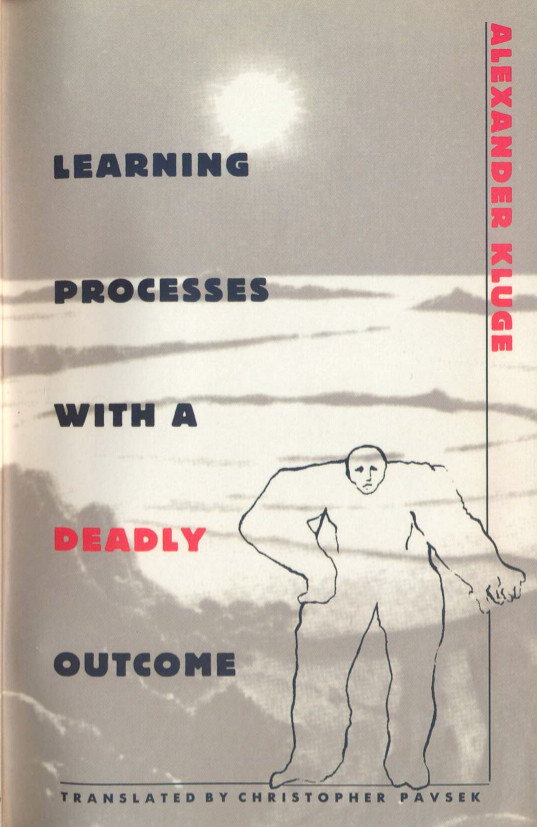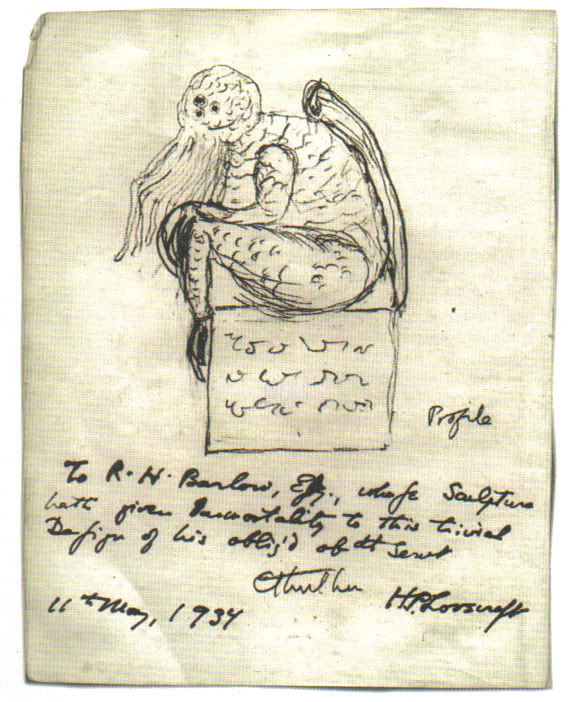Alexander Kluge: Learning Processes with a Deadly Outcome (1973–)
Filed under fiction | Tags: · capitalism, montage, science fiction, utopia

“Written in a quasi-documentary style, this fascinating hybrid work combines science fiction with modernist forms of montage and reportage to describe a future in which Earth has been almost totally destroyed following the catastrophic Black War. The planet’s remaining inhabitants have been driven underground or into space where the struggle to establish a new society rages on.
Whether describing the scene in China where the devastated landscape is reconstructed according to old paintings, or in the galactic realm of the Starway where giant, turf-battling, corporate colonizing forces exploit the universe’s resources, Kluge tells his tale by inventing various forms of “evidence” that satirize the discourses of administrative bureaucracy, the law, military security, and the media. He gives us some of his most bizarre and hilarious characters in this peculiar world in which the remains of the past are mixed with the most advanced elements of the future. The cast includes highly specialized women workers who have adapted to the massive gravitational field of their heavy-metal planets, a commander with lethal foot-fungus, and ex-Nazi space pioneers who, in their lonely exile from the conflagrations on earth, spend their time carving enormous facsimiles of operatic sheet music in the forests of uninhabited planets.
With parody, and humor, Kluge shows how the survivors of Armageddon attempt to learn the art of civilization, and, despite the disaster they have suffered, how they set out to reproduce at new sites a caricature of a classic and fascistic feudal capitalism.” (from the back cover)
First published as Lernprozesse mit tödlichem Ausgang, Suhrkamp, Frankfurt am Main, 1973.
Translated, with an Introduction and Afterword by Christopher Pavsek
Publisher Duke University Press, 1996
ISBN 0822317443, 9780822317449
xiv+112 pages
via Charles
PDF (21 MB, no OCR)
More from Kluge.
Kathy Acker: Empire of the Senseless. A Novel (1988)
Filed under fiction | Tags: · appropriation, body, cyborg, gender, science fiction, sexuality

“Set in the near future, in a Paris devastated by revolution and disease, Empire of the Senseless is narrated by two terrorists and occasional lovers, Thivai, a pirate, and Abhor, part robot and part human. Together and apart, the two undertake an odyssey of carnage, a holocaust of the erotic. ‘An elegy for the world of our fathers,’ as Kathy Acker calls it, where the terrorists and the wretched of the earth are in command, marching down a road charted by Genet to a Marseillaise composed by Sade.” (from the back cover)
Publisher Grove Press, New York, 1988
ISBN 0802110797
227 pages
Commentary: Peter Wollen (London Review of Books, 1998).
PDF (18 MB, no OCR)
Comment (0)H. P. Lovecraft: The Call of Cthulhu (1928–) [EN, FR, CZ, PL, RU, IT, DE, ES, PT]
Filed under fiction | Tags: · horror

Sketch of Cthulhu by Lovecraft, 1934.
‘The Call of Cthulhu’ is one of H. P. Lovecraft’s best-known short stories. Written in the summer of 1926, it was first published in Weird Tales, February 1928. It is the only story written by him in which the extraterrestrial entity Cthulhu himself makes a major appearance.
Wikipedia
Publication history, (2)
The Call of Cthulhu (English, 1928, Wikisource)
L’appel de Cthulhu (French, 5 trans.: Jacques Papy 1954, Claude Gilbert 1975, Jean Balczesak c1992, Simone Lamblin c2002, Maxime Le Dain 2012, via)
Volání Cthulhu (Czech, trans. Ondřej Neff, 1990, pp 23-32, 38 MB)
Zew Cthulhu (Polish, trans. Ryszarda Grzybowska, HTML, 1983)
Zov Ktulchu (Russian, trans. Э. Серова, П. Лебедев, Т. Мусатова, Т.Таланова, TXT, 1993)
Il richiamo di Cthulhu (Italian, trans. Gianni Pilo, 1994)
Volání Cthulhu (Czech, trans. Leviathan, 2007)
Der Ruf des Cthulhu (German, trans. Andreas Diesel and Frank Festa, 2008)
La llamada de Cthulhu (Spanish, n.d., HTML)
O chamado de Cthulhu (Portuguese, n.d.)
Comic books:
Los mitos de Cthulhu (Spanish, drawn by Alberto Breccia, adapted by Norberto Buscaglia, 1975/80, 80 MB)
The Call of Cthulhu (drawn by John Coulthart, 1994, 8 MB, via)
See also Donna Haraway’s talk (25 min, May 2014) and video interview (36 min, Aug 2014, PT subs) introducing the concept of ‘Cthulhucene’.
Comment (0)
